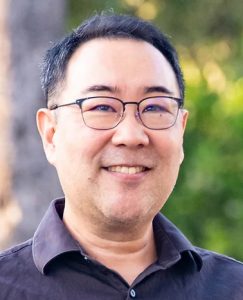One of the most under-the-radar battles going on within American evangelicalism today is a civil war between Christian higher education and the local church.
If you’ve missed this new trend, there’s a good reason: The more overt stories of abuse within schools and churches catch our attention and cause us not to see the more subtle trends.
For example, Liberty University, the world’s largest Baptist school, entered the spotlight in recent years after Jerry Falwell Jr. stepped down due to a sex and financial scandal that included accusations of blackmail involving Michael Cohen, the former attorney to President Trump.

Rick Pidcock
The Master’s Seminary, led by John MacArthur, withdrew its membership from the Evangelical Council for Financial Accountability after their accrediting body put the school on probation due to their “climate of fear, intimidation and bullying,” while also mentioning “appearance of conflicts of interest with the president’s son-in-law supervising a contract from which he benefits.”
Bob Jones University saw the resignation of their widely beloved president, Steve Pettit, after the board of trustees became so upset about a male student looking “like a gay man” by wearing a wrap coat and about the length of female student’s shorts that they colluded behind Pettit’s back in a scheme involving alternative lawyers, secret meetings, unsecured computers, pictures of women’s bodies without their consent, and an overhaul of the board amidst a Title IX investigation.
Northern Seminary joined the fray when accusations of bullying were brought against President Bill Shiell, which led to a third of the students signing a letter to express no confidence in the board, the resignation of Shiell and the acting chair of the board, and one of the first whistleblowers being fired by the board.
Additional stories of power struggles in Christian higher education continue with Joe Rigney’s resignation at Bethlehem Seminary due to his embrace of Christian nationalism, Adam Greenway’s resignation at Southwestern Seminary due to financial liabilities and declining enrollment, the potential closing of The King’s College amidst financial chaos and a lack of transparency, and Karen Swallow Prior leaving Southeastern Seminary while citing that she does not share “the same vision for carrying out the Great Commission” and believes she is “not well-suited to the politics of institutional life in the SBC.”
While it is important for religion journalists to report on these stories, it can be tempting to get so caught up in the drama of the public explosions that we miss some of the underlying systemic conflicts plaguing Christian schools today.
An educational institution, a ministry or a business
In his newly released book, Asian American Apostate: Losing Religion and Finding Myself at an Evangelical University, R. Scott Okamoto writes: “It was often discussed among faculty, quietly, that EVU (the name Okamoto gives his former school in his book) was structured as a business instead of as a university. The product was a degree, and students were paying customers.”

Scott Okamoto
In an interview with Baptist News Global, Okamoto further explained: “I was part of a group of professors who noted the contradictions in how the school advertised itself as a ‘top-notch’ academic institution and a foundation for conservative, fundamentalist, evangelical faith. We knew the two were incompatible. And when it came to its predictable clashes, the fundamentalist side usually won out.”
Okamoto’s school was investigated by its accrediting board, leading to a two-year probation. Okamoto told BNG: “The probation report notes the meddling of the board with day-to-day operations, particularly the academic freedoms of the professors. The report also notes how the school claims to value academic freedom in contrast with professors and students who claim meddling from the board. I was visited by three board members in my classes after I was placed on a ‘bad’ list.”
Inextricably tied to capitalism and profit
Because evangelical schools are structured as businesses, their theology tends to bend the knee to capitalism.
Okamoto believes evangelicalism “is inextricably tied to capitalism and profit.” He explains in his book, “But the gilded ivory tower, which pretends to promote academics and critical thinking, is a foundational component of evangelical culture that feeds into evangelical churches and communities.”
“When I was forced to meet with the president and vice president of the student business club because of jokes I made about the study of business, I was shocked to hear them admit that their business classes had never once brought up the contradictions of a capitalist society with the teachings of Jesus,” Okamoto said.
“Even the most ‘on-fire’ freshmen tend to come in with dreams of both serving God and making tons of money.”
“This is simply part of the culture,” he said. “Even the most ‘on-fire’ freshmen tend to come in with dreams of both serving God and making tons of money.”
One evidence of these values is in the business structure of employee salaries.
“The president made over 400k when I was there. Starting profs made a little over 40k. Adjuncts were among the lowest paid in SoCal. Sounds like a business,” Okamoto said. “The divide between administration pay and faculty pay grew wider as time went on, reflecting corporate and business trends of the time. I have some bombshell stories with emails to back me, but I’m keeping them in case I need to use them.”
Valuing capitalism and profit also showed up through the campus bookstore selling a license plate frame that had the school’s name on it, along with a reference to Jeremiah 29:11, which says that God has “plans to prosper you.”
Self-preservation through American politics
Of course, not all evangelical schools teach the prosperity gospel.
The conservative evangelical “American Gospel” documentaries attempt to deconstruct the prosperity gospel of Okamoto’s former school in exchange for a gospel of penal substitutionary atonement. But all evangelical schools are dependent on denominations or local churches to survive. And as Okamoto writes in his book, “Self-preservation always trumps deeply held evangelical convictions.”
“Self-preservation always trumps deeply held evangelical convictions.”
According to Okamoto, one of the clearest examples of self-preservation is how evangelicals change their political convictions depending on who gives Republicans the best opportunity to gain political power.
“Evangelical culture often claims to be this eternal entity, but it changes and evolves with each presidential election cycle,” he said. “Probably more often. Everything changes in evangelical culture. When I was a kid, Mormonism was the greatest threat to the world. But when Mitt Romney won the GOP nomination in 2012, evangelicals universally supported him, claiming him as one of their own. During Obama, evangelicals were polled and almost universally indicated that a president’s moral character was crucial to their vote. And then during Trump, almost none of them felt that way.”
Self-preservation through hierarchy
While evangelical churches and schools tend to be on the same side toward outsiders regarding self-preservation through politics, internally they face off through creating hierarchies between each other.
In some cases, this means churches attempt to position themselves with power over schools.
“The only time local churches were upset at (Okamoto’s former school) was when the school did not adhere to the evangelical game plan,” Okamoto said. “The school refused to take an official stance on gay marriage when Prop 8 was on the ballot. And when the Student Life people removed the prohibitions against same-sex relationships, local and national churches complained loudly.”
In other cases, some schools attempt to position themselves over churches. When I was a student at Bob Jones University, the school had a cult-like status among local churches and had such authoritarian power over faculty and students that churches were too afraid to question such insignificant concepts as music style for fear of offending BJU and getting blacklisted from being a church where faculty and students could attend.
These power struggles are especially apparent in the classroom.
When I was a student at Northern Seminary, the professors invited us to have any discussion we wanted to. Despite Northern having an official non-affirming stance toward LGBTQ relationships, the students were allowed to discuss and even openly disagree with one another. But the students who were employed by churches were noticeably more hesitant to question traditional evangelical views than students like me who were not tied down to a church’s policies.
Redefining love
Conservative evangelicals often boast that their view of love is the biblical model that is untainted by culture. But despite the fact that their assumptions fail to recognize the culturally situated nature of marriage in the Bible, they also fail to notice how their identity as a business in a culture of capitalism and profit that values self-preservation through political power and relational hierarchies affects their own views.
Okamoto explained: “It goes back to the ‘paying customer’ model. I knew of administrators who would have been affirming of LGBTQ students and would have supported things like Black Lives Matter (I left before that existed), but they knew that supporting ‘liberal’ or social justice issues would mean being fired. And the reason they would be fired is because the students come to (his university) to have their conservative values reflected by the school, the classrooms, the board, chapel services, etc. When a professor expresses care for LGBTQ people or a chapel speaker talks about the environment, the school hears it from students and parents. The parents write the checks.”
“The parents write the checks.”
One area where Okamoto felt these culturally determined expressions of “love” related to race. In his book, he says there’s “something about the culture of ‘Christian love’ and evangelicalism” that encourages and invites racism, and that “almost nothing stands in its way when it presents itself.”
He elaborated in our interview: “So, when racism presents itself, as it did every day I was there, the paying customers are generally fine with it. That means the administration is fine with it. Most of the professors can look the other way or try to hear ‘both sides.’ The school can only survive if it caters to a declining population that wants an alternative to actual ‘top-notch’ schools and a Sunday school. To take a major stand against racism would make it appear to be too ‘woke’ or ‘CRT.’ And the top-down business model helps keep everything in check. No tenure. Anyone can be fired.”
This fear among the faculty in Christian schools was absent in Okamoto’s experience in community colleges.
“When I taught at community colleges, my mailbox was constantly filled with flyers from the faculty union informing us of the current demands and actions of the faculty to fight against the administration. It was a constant war. There was no war at (his evangelical school). Just scared faculty timidly raising objections which were shot down and ignored.”
Self-preservation through evolution or remaining static
“They claim an eternal Jesus who never changes,” Okamoto said. But as Christians begin their deconstruction journey, they often have very rapidly evolving views of Jesus.
In his book, Okamoto says: “So many versions of God and Jesus had come and gone through my life, and I started to wonder if version 14.0 in 2002 would last longer than the current operating systems on my computers. I wasn’t hopeful.”
In his case, the evolution led to walking away from Christian faith entirely.
But he noted, “What never changes in evangelical culture is the concept of in-groups and out-groups. Who is in the out-groups changes all the time.”
So for those who live in these institutions dedicated to self-preservation, Okamoto believes “control of others” is “basically the constant.”
A real sense of our humanity
Okamoto reflects in his book how opening up to evangelicalism’s out-groups gave him his “first real sense of humanity.”
He expanded: “I was lucky. My parents were fundamentalist, but they valued truth as much as their faith. So when confronted with facts that contradicted my ‘faith,’ it seemed natural to adjust the faith to the facts instead of the other way around. No ‘alternative facts’ for me. And in doing so, I felt my worldview and my heart grow to include people I had been taught to hate and fear.”
Of course, schools have to be financially viable in order to remain open. That’s always going to create tension with churches that have strong convictions about issues that are formed by self-preservation more than they know.
But if education is about knowledge and understanding, perhaps we should begin with knowledge and understanding of self and neighbor. And perhaps that real sense of humanity Okamoto found in his neighbor could be an opportunity for individuals within evangelical schools to begin healing.
“Christianity is good at teaching us to serve and love others more than ourselves,” Okamoto said. “It wasn’t until much later that I put it all together that my own flourishing and agency in this country is directly tied to that of other marginalized people.”
He concluded: “After I met those gay men, I wasn’t immediately affirming. It was a process that happened over the next few years, just as it was several years later that I began interrogating what it meant to be Japanese American. I started learning about my identity in college, but I wasn’t immediately comfortable in my own skin. If anything, it was the process that started in meeting those gay men that became a blueprint for me to see myself as deserving a chance to be fully known and understood.”
Rick Pidcock is a 2004 graduate of Bob Jones University, with a Bachelor of Arts degree in Bible. He’s a freelance writer based in South Carolina and a former Clemons Fellow with BNG. He recently completed a Master of Arts degree in worship from Northern Seminary. He is a stay-at-home father of five children and produces music under the artist name Provoke Wonder. Follow his blog at www.rickpidcock.com.


